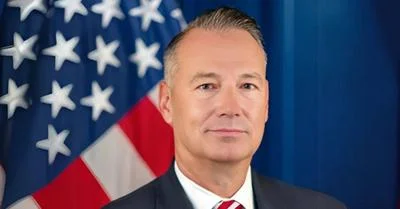Brian J. Gaines, a professor and senior scholar in the Political Science Department at the University of Illinois Urbana-Champaign | news.illinois.edu/ - L. Brian Stauffer
Brian J. Gaines, a professor and senior scholar in the Political Science Department at the University of Illinois Urbana-Champaign | news.illinois.edu/ - L. Brian Stauffer
Illinoisans generally are unaware of the every-decade redistricting process but they know what they want out of that process, a University of Illinois expert on gerrymandering said during a recent chat with fellow experts.
Some conclusions can be done based on "a little bit of polling" he's done with colleagues, as recently as last summer, Brian J. Gaines, a professor and senior scholar in the Political Science Department at the University of Illinois Urbana-Champaign, said. That polling found people generally don't know who draws redistricting maps or much about them.

"If you ask them who drew up the state's map, who drew the U.S. House districts, who drew the county districts, most people don't know," Gaines said. "They'll tell you they don't know or if they tell you they do know, they might give you the wrong answer. So there's not a great deal of attention or awareness."
That ignorance "facilitates mapmakers to draw any kinds of maps that can be described as having a political purpose," Gaines said.
Yet when those same people are asked who should draw maps or what they want those maps to be like, they had "pretty strong preferences" for "simple shapes" in districts, Gaines said. If those simple shapes aren't present, the same people "think something is up," particularly if district shapes are drawn in crazy, meandering ways as they are now in Illinois.
"Someone is cheating in some way and for some purpose," Gaines said. "That's not the kind of map they would like."
Another strong reference among those polled is for nonpartisan maps.
"Even people who say they are strong Republicans or strong Democrats don't tend to pick the map that favor their party," Gaines said.
Gaines' comments came during an Illinois Extension CED chat among experts, "Redistricting Process: The Future of Illinois Politics," posted to YouTube on April 21. Other speakers included University of Chicago State Politics Professor Christopher Z. Mooney and University of Florida Political Science Professor Michael P. McDonald.
Gaines is a longtime critic of gerrymandering in Illinois. Back in 2011, Gaines told a U of I news outlet that the maps then drawn up failed a "fairness with a bipartisan or non-partisan process" test.
"They were crafted by partisan insiders operating mostly in secret, and they passed by straight party votes in both chambers," Gaines told U of I at the time. "Democrats control the state government, and they've used their power to the full, especially in the redrawing of congressional districts."
This year is critical for redistricting in Illinois because U.S. Census data is about to be released and redistricting is traditionally based on that data. Under Illinois' Constitution, state lawmakers must pass a new legislative map by June 30. If that doesn't happen, an eight-person bipartisan panel is to be created. Should that group be locked in a tie, Illinois' Secretary of State would randomly choose a ninth member to break the tie.
The still-ongoing COVID pandemic has complicated the process by delaying U.S. Census data.
Meanwhile, one piece of legislation, Senate Bill 1325, the People's Independent Maps Act, would remove politicians from making decisions about redistricting and place that power in the hands of Illinoisans. SB 1325 has until its Friday, April 30, deadline to come up for a third reading.
Gaines, during the podcast, discussed various forms of gerrymandering but said the process that creates such redistricting remains a murky mystery to most.
"Most people don't pay a lot of attention unless they're really interested in politics or they're directly involved," he said. "It's a little bit too arcane."






 Alerts Sign-up
Alerts Sign-up